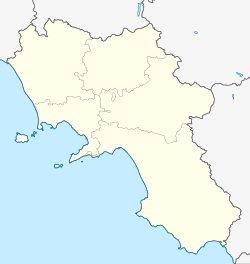|
Campagna
   Campagna (Italian: pronounced [kamˈpaɲɲa]) is a small town and comune of the province of Salerno, in the Campania region of Southern Italy. Its population is 17,148.[3] Its old Latin name was Civitas Campaniae (City of Campagna). Campagna is located in one of the valleys of the Picentini Mountains, at an altitude of 270 meters above sea level. HistoryThe first records of the area date back to the ninth century in the Lombard period. The position of the town was strategic for enemies attacks during the Middle Ages. Lately, the town became an important cultural and religious center. It was the seat of bishops until 1973, when the Diocese of Campagna merged with the Archdiocese of Salerno. During the Second World War, Campagna was a temporary home for many Jews thanks to Giovanni Palatucci and his uncle Giuseppe Maria Palatucci. People arrived from the north of Italy and Campagna citizens hid those people in the basements of the churches. Giovanni Palatucci was later honoured as a Righteous Among the Nations by the Yad Vashem Holocaust Memorial. Much of this is documented in Elizabeth Bettina's book, It Happened in Italy. Today, goods left by the Jews are shown in the Museo della Memoria in the town centre. GeographyCampagna borders with Acerno, Contursi Terme, Eboli, Olevano sul Tusciano, Oliveto Citra, Postiglione, Serre and Senerchia (this one in the Province of Avellino), The municipality counts the frazioni of Camaldoli, Galdo, Mattinelle, Puglietta, Quadrivio, Romandola-Madonna del Ponte, Santa Maria La Nova and Serradarce. Other localities are Avigliano, Folcata, Oppidi-Varano, Saginara and Sant'Angelo. Tourist destinations
Castles, palaces, fountains and bridges
Churches, religious buildings and structures
Museums
Nature reserve
Notable people
A' Chiena Campagna is famous for its traditional summer event ‘A Chiena’ (Italian: La Piena), which takes place annually every weekend between July and August. During the event, the city river Tenza is deflected from its natural course through the city main street where people wait for the water to come.[4] This tradition comes from the ancient practice of cleaning the streets by using the river water. Later, it was converted into a delightful moment for locals and tourists.[5] I FucanoliI Fucanoli is festival in honour of Sant'Antonio, taking place on 17 January. The celebrations begin in the late afternoon with a service followed by a procession whereby the Sant'Antonio statue is carried in the streets of the city centre. While the statue is carried through the streets, huge fires are ignited. Sister cityMonte Carlo in the Principality of Monaco is Campagna's sister city. References
External links
|
||||||||||||||||||||||||||||||||||||||||||||||||||||||||||





